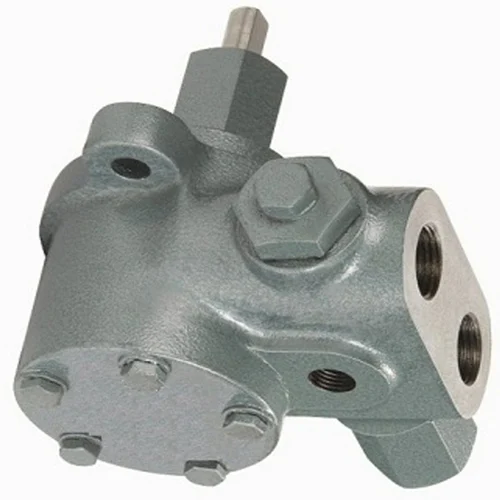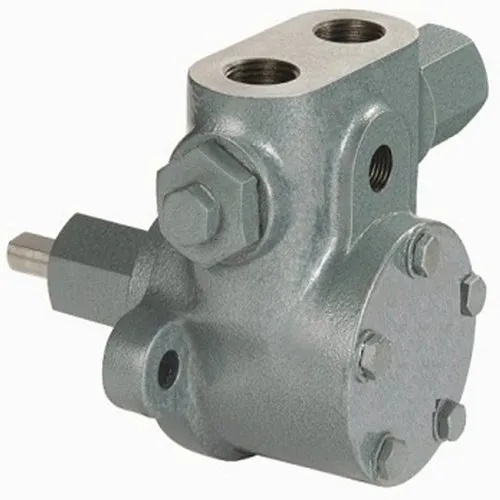Oil Pump for Boilers
Heating systems play a crucial role in keeping our homes and businesses warm and comfortable, especially during the colder months. Boilers are commonly used in these systems, and an essential component of a boiler is the oil pump. In this article, we will explore the significance of an oil pump for boilers, its functionality, and the factors to consider when selecting the right pump for your heating system.

1. Importance of an Oil Pump for Boilers
An oil pump serves as the heart of a boiler system, ensuring the proper supply of fuel oil to the burner for efficient combustion. It plays a vital role in maintaining consistent and reliable heating performance. Without a functioning oil pump, the boiler would not be able to deliver the necessary heat to warm your home or commercial space effectively.
2. How Does an Oil Pump Work?
The oil pump draws fuel oil from the storage tank and delivers it to the burner through a series of pipes and valves. It creates the necessary pressure to ensure a steady flow of oil, allowing for efficient combustion within the boiler. The pump is typically driven by an electric motor or is integrated into the boiler’s combustion system.
3. Types of Oil Pumps for Boilers
There are several types of oil pumps commonly used in boilers. Let’s explore three of the most common types:
3.1 Rotary Gear Pumps
Rotary gear pumps are widely used in boiler systems due to their reliability and ability to handle high pressures. They consist of two meshing gears that create chambers to trap and transport oil. This type of pump operates smoothly and quietly, making it an excellent choice for residential and commercial heating systems.
3.2 Vane Pumps
Vane pumps utilize rotating vanes to create chambers that move oil from the suction side to the discharge side. They offer good efficiency and are suitable for boilers with medium oil flow requirements. Vane pumps are known for their durability and ability to handle varying viscosities of fuel oil.
3.3 Screw Pumps
Screw pumps are commonly used in larger boiler systems that require high flow rates. They feature two or three intermeshing screws that move oil from the inlet to the outlet. Screw pumps are known for their excellent suction capabilities and smooth operation, making them suitable for heavy-duty heating applications.
4. Factors to Consider When Choosing an Oil Pump
When selecting an oil pump for your boiler system, it’s important to consider the following factors:

4.1 Pump Capacity
The pump capacity should match the fuel oil requirements of your boiler. It’s crucial to determine the appropriate flow rate and pressure needed to ensure optimal performance and prevent issues such as fuel starvation or excessive oil flow.
4.2 Efficiency and Energy Consumption
Choosing an energy-efficient oil pump can help reduce operating costs and minimize environmental impact. Look for pumps with high efficiency ratings and features such as variable speed drives that optimize fuel consumption based on demand.
4.3 Pressure and Flow Rate
Consider the required pressure and flow rate of your heating system when selecting an oil pump. Ensure that the pump can deliver oil at the necessary pressure to achieve proper combustion and maintain consistent heat output.
4.4 Durability and Reliability
A reliable oil pump is essential for uninterrupted heating performance. Look for pumps made from high-quality materials that can withstand the demands of continuous operation. Additionally, consider pumps with built-in safety features such as overload protection and thermal shut-off.
4.5 Noise Level
For residential applications, noise level can be an important consideration. Choose an oil pump that operates quietly to avoid disturbances within your living space.
5. Installation and Maintenance of an Oil Pump
Proper installation and regular maintenance are crucial for the optimal performance and longevity of an oil pump. Consider the following guidelines:
5.1 Proper Placement and Mounting
Ensure that the oil pump is correctly positioned and securely mounted to minimize vibrations and prevent leaks. Follow the manufacturer’s instructions and consult with a professional if needed.
5.2 Regular Inspections and Cleaning
Perform routine inspections to check for any signs of wear, leaks, or blockages. Clean the pump and its components as recommended by the manufacturer to prevent performance issues caused by dirt or debris.
5.3 Lubrication and Component Checks
Some oil pumps require regular lubrication or component checks. Follow the maintenance schedule provided by the manufacturer and use the recommended lubricants to keep the pump running smoothly.
6. Common Issues and Troubleshooting
Despite their reliability, oil pumps may experience certain issues. Here are some common problems and troubleshooting tips:
6.1 Pump Leaks and Seal Problems
Leaks or seal failures can lead to oil spills and reduced pump efficiency. Inspect the pump for any signs of leakage and replace faulty seals promptly. Consult a professional if leaks persist.
6.2 Noisy Operation
Excessive noise during pump operation can indicate worn-out components or misalignment. Check for loose parts, worn bearings, or damaged gears. Seek professional assistance if necessary.
6.3 Loss of Prime
A loss of prime occurs when the pump fails to draw oil from the storage tank. Check for clogged filters, airlocks, or insufficient oil supply. Reestablishing the prime may require bleeding the system or adjusting valves.
6.4 Insufficient Fuel Supply
If your boiler fails to produce adequate heat, it may be due to an insufficient fuel supply. Check the oil pump for any clogs, filter blockages, or faulty components that could impede oil flow.
7.Benefits of Upgrading to a High-Efficiency Oil Pump
Upgrading to a high-efficiency oil pump offers several benefits:
- Improved Energy Efficiency: High-efficiency oil pumps are designed to minimize energy wastage, leading to lower fuel consumption and reduced heating costs. By optimizing fuel delivery, these pumps ensure efficient combustion and maximum heat output.
- Environmental Friendliness: Energy-efficient oil pumps contribute to reducing greenhouse gas emissions. By consuming less fuel, they help lower carbon footprints and promote a cleaner and more sustainable environment.
- Enhanced Performance and Comfort: High-efficiency oil pumps deliver a consistent and reliable flow of fuel oil, ensuring a steady and even heat distribution throughout the heating system. This results in improved comfort and a more pleasant living or working environment.
- Longer Lifespan: Upgrading to a high-quality oil pump can extend the lifespan of your heating system. These pumps are built to withstand continuous operation, reducing the risk of breakdowns and the need for frequent replacements.
- Quieter Operation: Many high-efficiency oil pumps are designed to operate quietly, minimizing noise disruptions within the living or working space.
The oil pump is a vital component of a boiler system, responsible for delivering fuel oil to the burner for efficient combustion. Choosing the right oil pump for your heating system is crucial to ensure optimal performance, energy efficiency, and reliability. Consider factors such as pump capacity, efficiency, pressure, and flow rate when selecting an oil pump. Additionally, proper installation, regular maintenance, and troubleshooting are essential for the smooth operation and longevity of the pump. By understanding the importance of an oil pump and its functionality, you can make informed decisions to keep your boiler system running efficiently and effectively.
Oil Pump for Steam Boiler FAQs
The purpose of an oil pump in a boiler is to draw fuel oil from the storage tank and deliver it to the burner. It ensures a steady flow of oil at the proper pressure, facilitating efficient combustion and consistent heat output.
While it is possible to replace the oil pump yourself, it is recommended to seek professional assistance. A qualified technician will have the necessary expertise to ensure proper installation and minimize the risk of errors or damage.
Regular maintenance and servicing of the oil pump are crucial for optimal performance. It is recommended to follow the manufacturer’s guidelines and schedule professional maintenance at least once a year or as specified by the manufacturer.
Yes, it is possible to retrofit an older boiler with a new oil pump. However, it is essential to consult with a professional to determine compatibility and ensure proper installation.
Yes, there are eco-friendly options for oil pumps. High-efficiency oil pumps are designed to reduce energy consumption and minimize environmental impact by optimizing fuel usage and reducing carbon emissions.
A Steam boilers oil pump is a mechanical device that is used to transfer oil from a storage tank to a boiler. The pump uses a motor to drive a piston or impeller, which creates a pressure difference that forces the oil to flow.
There are two main types of boilers oil pumps: positive displacement pumps and centrifugal pumps. Positive displacement pumps move a fixed amount of fluid with each cycle, while centrifugal pumps move a variable amount of fluid depending on the speed of the pump.
Industrial steam Boilers oil pumps offer a number of benefits, including
* Increased efficiency: Boiler oil pumps can help to improve the efficiency of your boiler by ensuring that the oil is delivered at the correct pressure and flow rate. * Reduced maintenance: Boiler oil pumps can help to reduce the need for maintenance on your boiler by preventing the build-up of sediment and contaminants in the oil lines. * Longer lifespan: Boiler oil pumps can help to extend the lifespan of your boiler by reducing the wear and tear on the boiler’s components.
When choosing a boiler oil pump, you need to consider the following factors:* The size of your boiler: The pump you choose needs to be able to handle the flow rate and pressure requirements of your boiler. * The type of oil you use: The pump you choose needs to be compatible with the type of oil you use. * The installation requirements: The pump you choose needs to be compatible with the installation requirements of your boiler.
Boiler oil pumps are available for purchase from a variety of retailers, including plumbing supply stores, heating and cooling supply stores, and online retailers.
Furnace Oil Pump
A major component of oil furnaces is the oil pump and its job is to pump oil from the oil tank to the oil burner.
These pumps are widely used in oil burners for supplying oil with high flow rate, owing to their excellent operational efficiency and resilient design.
Buy Boiler Spare Parts at the Best Price
Thermodyne Boilers supplies 100+ Industrial Boiler Parts all over India. Contact our sales team & send your requirement to get prices & discounts
